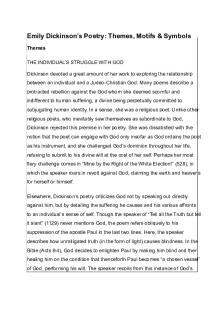RHINOCEROS Eugène Ionesco ← Themes, Motifs, and Symbols → Themes Will and Responsibility DOCX

| Title | RHINOCEROS Eugène Ionesco ← Themes, Motifs, and Symbols → Themes Will and Responsibility |
|---|---|
| Author | Kamal Sharma |
| Pages | 6 |
| File Size | 25.1 KB |
| File Type | DOCX |
| Total Downloads | 159 |
| Total Views | 342 |
Summary
RHINOCEROS Eugène Ionesco ← Themes, Motifs, and Symbols → Themes Will and Responsibility The transformation of Berenger from an apathetic, alcoholic, and ennui- ridden man into the savior of humanity constitutes the major theme of Rhinoceros,and the major existential struggle: one must commit onesel...
Description
RHINOCEROS Eugène Ionesco Themes, Motifs, and Symbols Themes Will and Responsibility The transformation of Berenger from an apathetic, alcoholic, and ennui- ridden man into the savior of humanity constitutes the major theme ofRhinoceros,and the major existential struggle: one must commit oneself to a significant cause in order to give life meaning. Jean continually exhorts Berenger to exercise more will-power and not surrender to life's pressures, and other characters, such as Dudard, seem to do just that as they control their own destinies. Berenger does not have great conventional will- power, as demonstrated by his frequent recourse to alcohol and his tendency to dream (both daydreams and nightmares). However, he maintains a steadfast, latent sense of responsibility after Act One, often feeling guilty for the various rhinoceros- metamorphoses around him—in a sense, his initial apathy was the cause, helping promote a climate of indifference and irresponsibility. Furthermore, he shows early on that he at least cares about Daisy, the only evidence in the play, other than Mrs. Boeuf's devotion to Mr. Boeuf, of sincere love for another human. By Act Three, his powerful guilt and sense of responsibility indicates that Berenger practices the most selfless kind of love—unconditional love for all humanity, whereby he is concerned for the welfare even of those who have scorned him. This all-encompassing love is what gives his life meaning. The supposedly strong characters, like Jean, fail the ultimate test of will- power, the rhino-epidemic, and their crumbling wills are foreshadowed by their subtler evasions of responsibility—Daisy, for instance, wants to live a guiltless life. Their idea of will borrows from Friedrich Nietzsche's concept of "the will to power." For them, will is a means to metamorphose into Nietzsche's "super-man," a powerful being beyond human morality. The savagery of the rhinos, and Jean's transformation and statements in Act Two, exemplify this desire for power. He becomes violent, claims humanism is dead, and tries to trample Berenger. The play's final irony is that Berenger becomes the true super-man, gathering his resources of will, built on a foundation of love for his fellow man, to take responsibility for humanity. Logic and Absurdity Rhinocerosexposes the limitations of logic, and absurdity reigns as the dominating force in the universe. Self-proclaimed rational characters, such as the Logician, Botard, and Jean, either flounder in their proofs (the Logician, especially) or ridiculously rationalize 5/7/22 AXP Internal Page 1 of 6...
Similar Free PDFs

Paradise Lost Themes, Motifs and
- 3 Pages

Hamlet themes motifs handout
- 10 Pages
![[seq2-txt06]-Ionesco-Rhinoceros](https://pdfedu.com/img/crop/172x258/56v7kgxroq19.jpg)
[seq2-txt06]-Ionesco-Rhinoceros
- 1 Pages
Popular Institutions
- Tinajero National High School - Annex
- Politeknik Caltex Riau
- Yokohama City University
- SGT University
- University of Al-Qadisiyah
- Divine Word College of Vigan
- Techniek College Rotterdam
- Universidade de Santiago
- Universiti Teknologi MARA Cawangan Johor Kampus Pasir Gudang
- Poltekkes Kemenkes Yogyakarta
- Baguio City National High School
- Colegio san marcos
- preparatoria uno
- Centro de Bachillerato Tecnológico Industrial y de Servicios No. 107
- Dalian Maritime University
- Quang Trung Secondary School
- Colegio Tecnológico en Informática
- Corporación Regional de Educación Superior
- Grupo CEDVA
- Dar Al Uloom University
- Centro de Estudios Preuniversitarios de la Universidad Nacional de Ingeniería
- 上智大学
- Aakash International School, Nuna Majara
- San Felipe Neri Catholic School
- Kang Chiao International School - New Taipei City
- Misamis Occidental National High School
- Institución Educativa Escuela Normal Juan Ladrilleros
- Kolehiyo ng Pantukan
- Batanes State College
- Instituto Continental
- Sekolah Menengah Kejuruan Kesehatan Kaltara (Tarakan)
- Colegio de La Inmaculada Concepcion - Cebu












